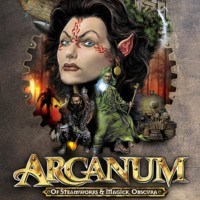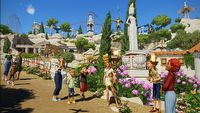Arcanum Had Its Problems, but It's Still Great Steampunk cRPG
Today Arcanum is a forgotten title if you aren't in the niche of isometric RPGs, nevertheless, it has earned a small group of fans. Technically it was a bit lame, it's true, but it worked incredibly on the imagination and in many ways was simply outstanding.
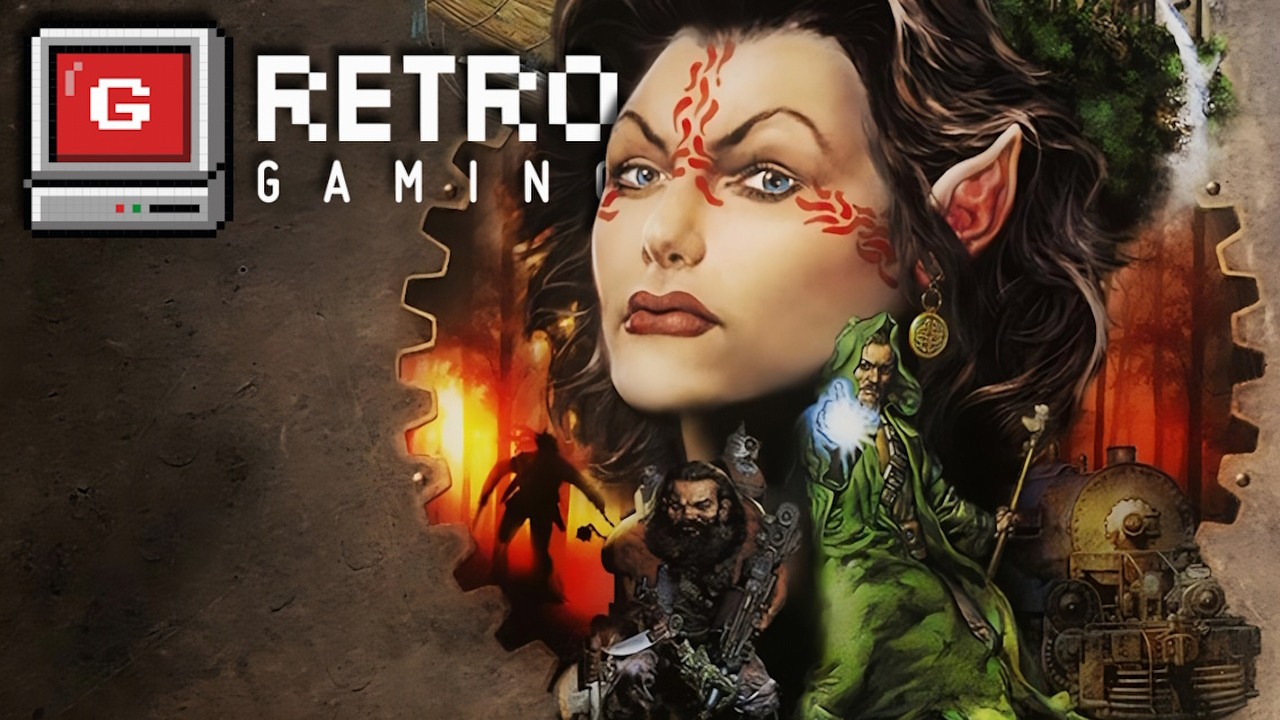
Funny thing about this Arcanum. I genuinely adore this game and can play it anytime, day or night, knowing that I will have an amazing time. At the same time, I probably can't unequivocally recommend it to new players. Especially those who appreciate smooth gameplay or balanced mechanics. The steampunk RPG from Troika Games is as close to 23 years old as you can get. You can see it in the graphics or HUD. Unfortunately, it was also made in a "Spartan" manner because a stable game of Troika isn't a Troika game (although it was still much better than in the case of Vampire: The Masquerade - Bloodlines).
However, if my warnings don't scare you, then prepare yourself for an essentially outstanding game. Such a fantastic storyline, world, interaction with the environment, dialogues, or NPCs would not be out of place in Fallout 2, Baldur's Gate 2, or perhaps even Planescape: Torment—games that at that time set the standards for the genre.
Story about machines and magic
Every aspect convinced us that we were dealing with a game different from all others - including the unique atmosphere emanating from the graphic assets, sounds, dialogues, and plot. Arcanum took us to a steampunk world, strongly inspired by our 19th century. A world where magic is being overshadowed by technology, and where half-orcs, half-ogres, elves, dwarves, and halflings parade alongside humans on industrialized streets.
We embody a character who is the sole survivor of a zeppelin disaster, and on the spot, we are greeted by the inspired herald Virgil (who is also a great warrior and healer). He falls on his knees before us and claims that we are the chosen one from the prophecy. To confirm the gravity of the situation, a religious order of assassins starts hunting us, marking the beginning of a highly complex intrigue that will take us across a vast continent filled with technology, magic, ancient secrets, and conflicts between all elements.
The plot theoretically touched upon the daunting task of saving the world, but it did so devilishly intelligently, playing with our expectations and intertwining pulp motifs with brilliantly written human - and non-human - dramas. The dialogues were top-notch; it's still hard to find equally good conversations between characters today. A huge advantage of this story, as well as the gameplay itself, was that we could experience them in various ways.
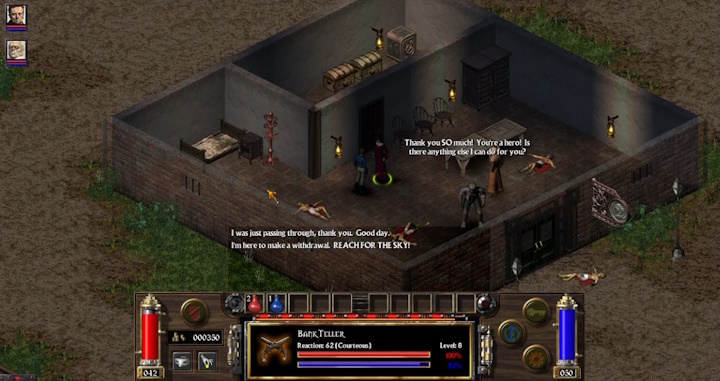
Arcanum is an RPG full of possibilities
If you played Arcanum at the right time, that is in the early 2000s, this game could have been a kind of mini Baldur’s Gate 3 for you. This means that it had so many rotating elements and offered such a high level of non-linearity that it was worth going through it at least a few times from start to finish, to see how events could unfold differently - despite the obligatory plot points to check off. Besides, finding solutions to problems was quite enjoyable.
The way we built our character not only affected how we fought but also determined the tools we had at our disposal to solve the plots and obstacles presented by the scenario and gameplay. For instance, a thief could obtain information by simply stealing documents, while a necromancer could awaken a corpse from its slumber, and a blunt brute or a negotiator with a backup would do it differently.
We could build the character in so many ways that Fallout 2 would be proud. I could finish the game with most of them. I always promised myself to do a run with a knucklehead character, but I always ended up putting a few points into intelligence, and the fun ended there. I preferred the fencer-negotiator with a blacksmith's flair, but playing with mages is also great (archers had it a bit worse). In general, the comparison to Baldur's 3 comes from the fact that I finished the game several times – there is even an epilogue for nihilists – and I started it so many times that I stopped counting.
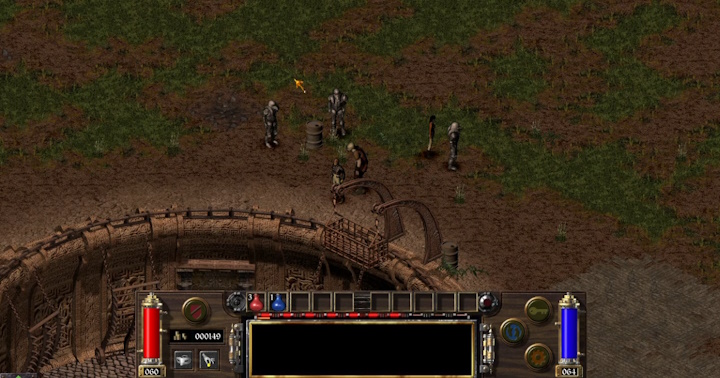
Two aspects favored such gameplay - a great, classless character development system based on race, gender (which mattered the least, but at some moments, someone reacted differently to us), past (this changed a lot and provided special modifiers), statistics, and a range of skills. We maximized these with points but also increased the rank (e.g. from student to expert or master) with NPCs. The only limitation was the maximum character level - and this could easily be removed with unofficial patches or other mods.
The second issue is the clunky engine, but full of interactive objects. Although we couldn't move anything (unlike, for example, Divine Divinity), we could influence many things with attacks, skills, or pyrotechnics. This combination of systems and environment created a space for playing quests like few others - and since the game didn't hold our hand too tightly, we could strategize quite a bit. And this strategizing was rewarded with subsequent chapters of a great plot and how the world reacted to us.
Hunting for equipment in the cRPG was particularly rewarding - we consistently found some loot in the same location, but the game also presented us with treasures from a random pool. In the case of loot, the game once again showed attention to detail – a halfling, for example, had to wear a different size of clothes or armor than a human or half-ogre (they were the hardest to dress).
A few issues
Arcanum was a very complicated mechanical system and some of the components didn't work as they should. The combat, for instance, simply was there. And it was severely unbalanced. Gunmen had a hard time, while mages and melee warriors were sweeping the field. Furthermore, in real-time mode, the fights became trivial when we had a large party - I remember that by the end of the game, I didn't even have time to get closer, and my team was already demolishing everything. At least in real-time, because we could also fight in turns and gain full control over the combat.
Back then everything was, let's say, Fallout-like and more calm. It was effective against really tough enemies, but many builds made us consider only a few as worthy opponents. Nonetheless, a fantastic feature was the ability to switch between combat modes at any time, instead of having to decide once for the entire game. Many contemporary games wouldn't be ashamed of such a quality of life option.
The second issue is the technical condition, which can still frustrate players today, despite fan patches and mods. NPCs can cast spells, just like the main character. The game was freezing, crashing to the desktop, enemies sometimes froze. There were times when we lost our reputation among our companions for defending ourselves against someone, so some ratios and algorithms probably weren't well controlled (and an angry companion could leave or even attack us). It must also be admitted that Arcanum was quite clumsy to handle. I love every pixel, HUD, character, object, and map, but that's probably because I played at the right time and place, with an absorbent mind and ability to focus unaffected by social media and modern titles. But who knows, maybe today there will be a young fan ready to give it a chance?
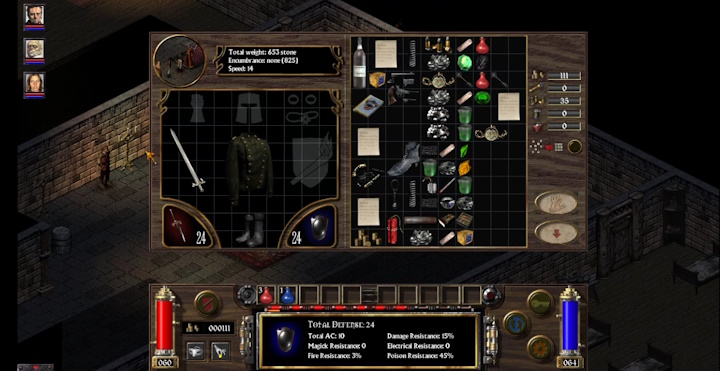
Classic
On the day of the game's release, reviewers criticized the graphics, because there were creations, even in this genre, that were much nicer and less square, but honestly - from a time perspective, this retro atmosphere only does Arcanum justice. It has something of Ultima 8 in it, and the level of detail is sufficient. This job is done with a specific, rather dirty, and subdued color palette. No other game provided a similar atmosphere, especially when combined with the string music drifting somewhere in the background.
How to play Arcanum: Of Steamworks and Magick Obscura today?
The GOG and Steam versions (costing $5.99) will probably run on their own, but if you want to improve the gameplay, fix some bugs, and, most importantly, lower the difficulty level limit (I was able to reach it just halfway through the game) – it's worth considering at least the Unofficial Patch.
Arcanum is a game rather for connoisseurs precisely because it's moderately comfortable and intuitive. Something like a beautiful car introduced before the era of common power steering. However, if you enjoy delving into systems and deconstructing games, appreciating retro styling, while also expecting a story and gameplay that challenges you to think, then you will find few RPGs that offer a similar level of experience and coherence. Especially in a steampunk setting.
- Larian Studios dispels doubts about Divinity once and for all. New RPG may follow in Baldur's Gate 3's footsteps, but release is a long way off
- Bethesda doesn't have a heart for fans of The Elder Scrolls 6. Devs put it simply: they will give themselves „as much time as it takes to make the game great”
- Baldur's Gate 3 sales aren't slowing down even for a moment. Swen Vincke gave a new, round figure
0

Author: Hubert Sosnowski
He joined GRYOnline.pl in 2017, as an author of texts about games and movies. Learned how to write articles while working for the Dzika Banda portal. His texts were published on kawerna.pl, film.onet.pl, zwierciadlo.pl, and in the Polish Playboy. Has published stories in the monthly Science Fiction, Fantasy, and Horror magazine, as well as in the first volume of the Antologii Wolsung. Lives for "middle cinema" and meaty entertainment, but he won't despise any experiment or Fast and Furious. In games, looks for a good story. Loves Baldur's Gate 2, but when he sees Unreal Tournament, Doom, or a good race game, the inner child wakes up. In love with sheds and thrash metal. Since 2012, has been playing and creating live action role-playing, both within the framework of the Bialystok Larp Club Zywia, and commercial ventures in the style of Witcher School.
Latest News
- End of remote work and 60 hours a week. Demo of Naughty Dog's new game was born amid a crunch atmosphere
- She's the new Lara Croft, but she still lives in fear. Trauma after Perfect Dark changed the actress' approach to the industry
- „A lot has become lost in translation.” Swen Vincke suggests that the scandal surrounding Divinity is a big misunderstanding
- Stuck in development limbo for years, ARK 2 is now planned for 2028
- Few people know about it, but it's an RPG mixing Dark Souls and NieR that has received excellent reviews on Steam, and its first DLC will be released soon
